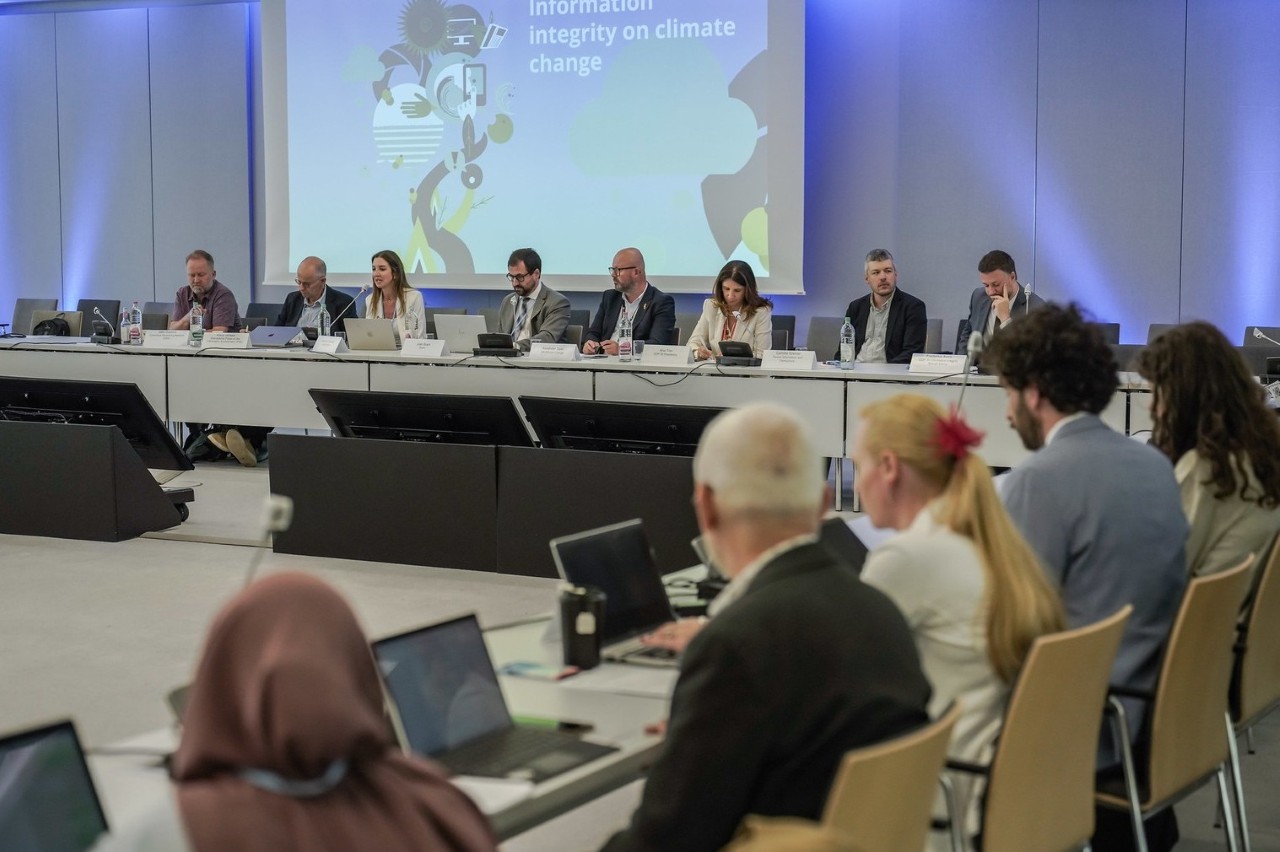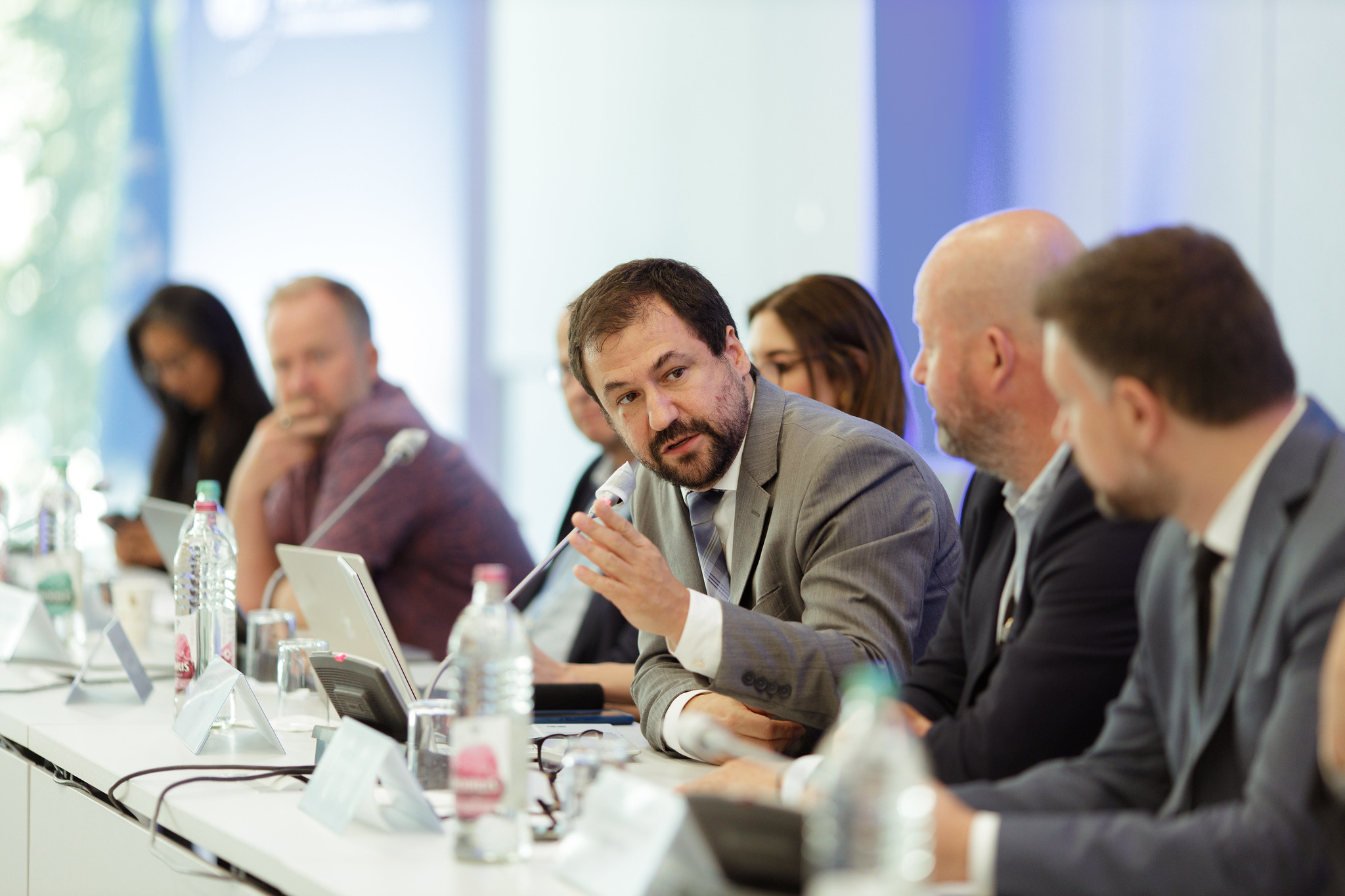Climate disinformation at the center of geopolitics: COP30 Presidency leads global coordination on the issue
At SB62, Brasil presented an international strategy to counter disinformation and strengthen climate public policy. The event in Bonn, Germany, convened authorities and experts to bolster multisectoral coalitions for information integrity

By Franciéli Barcellos de Moraes | COP30
Though not a new concern, the integrity of climate information has gained heightened complexity and urgency in recent years within the geopolitical landscape. Amid a growing wave of disinformation threatening to impede the progress of global climate action, the COP30 Presidency elevated the topic during the 62nd session of the Subsidiary Bodies of the United Nations Framework Convention on Climate Change (SB62) in Bonn, Germany. The side event, "Information Integrity on Climate Change," underscored the presidency’s commitment to fostering a reliable and trustworthy informational ecosystem—a crucial step for advancing negotiations on the topic.
The initiative sought to mobilize UNFCCC signatory countries and global stakeholders around the importance of ensuring a qualified public debate, grounded in scientific evidence. The meeting, which gathered researchers, government officials, and UN representatives, drew upon the Global Initiative on Climate Change Information Integrity, launched by the Brazilian federal government in partnership with the UN and UNESCO during the G20 Summit last November.
"The real problem with disinformation is that it delays our response. It leads us to focus on the wrong issues or to approach the topic with less urgency than it deserves"
— JOÃO BRANT, Secretary for Digital Policies / Secom PR
“The real problem with disinformation is that it delays our response. It leads us to focus on the wrong issues or to approach the topic with less urgency than it deserves,” stated João Brant, Secretary for Digital Policies at the Social Communication Secretariat of the Presidency of the Republic (SECOM PR), who chaired the session. He noted that between now and November, the goal will be to both harness existing knowledge and cultivate new initiatives.

The discussions highlighted that disinformation undermines public policy and weakens evidence-based solutions. To confront these challenges, it is essential to expand data production, research, and in-depth investigation—while also considering the disproportionate impacts on vulnerable populations, particularly in the Global South. The debate also emphasized the need for a clearer understanding of who funds digital disinformation, especially the connection between online advertising and the disinformation industry. Participants reinforced the importance of coordinated action at national, multilateral, regional, civil society, and scientific community levels for effective outcomes.
Charlotte Scaddan, the UN's Senior Advisor for Information Integrity, stressed that disinformation behavior is not marginal. It lies at the heart of the information ecosystem and is exploited by influential actors within states and civil society. "These climate disinformation agents are trying to undermine climate action. They are also weaponizing the issue to fuel social polarization and destabilize democratic processes, including elections. This directly impacts multiple areas of UN engagement," Ms. Scaddan stated.
COP30 CEO Ana Toni acknowledged the importance of addressing the issue, as well as the significance of recognizing and celebrating past climate achievements, such as the Paris Agreement. "If we begin to doubt the system we are part of and abandon multilateralism, that's exactly what disinformation and fake news want: to isolate us and bring things to a halt. So, as part of our strategy, I believe we must demonstrate the progress made over the last ten years. Celebrating this progress is pivotal,” Ms. Toni said.
Paths forward
In addition to presenting the challenges, the session explored potential solutions to the problem of disinformation. The discussion centered on the transformative potential of collaborative efforts through coalitions. The importance of building trust with communities in the long term was stressed, requiring inclusive approaches that value diversity, active listening, recognition of legitimate criticism, and open dialogue. The clear message was that no single actor will be able to face this challenge alone, and that only multisectoral coalitions can lead to an effective response.
Special envoy
Among the speakers was Frederico Assis, the special envoy for information integrity at COP30. This marks the first time the topic has achieved such prominence on the conference agenda. "Today, manipulative, conspiratorial, or simply false content is less about climate change itself — though that still exists — and more about a kind of strategic skepticism aimed at undermining efforts to address the climate crisis," he said. He also emphasized the importance of the Brazilian presidency addressing the issue holistically.
Envoys act voluntarily and in a personal capacity, serving as liaisons for information flow and community perception in the sectors they represent. This facilitates faster and more effective communication with the COP30 Presidency. They also serve as direct contact points to relay sectoral demands and requests.
Global Initiative on Climate Change Information Integrity
This international coalition, which is open to all and not just G20 members, focuses on generating knowledge about the impact of disinformation on climate action. The coalition also aims to strengthen climate communication campaigns and foster institutional and international cooperation to protect information integrity.
English version: Trad. Bárbara Menezes
Proofreading by Enrique Villamil
